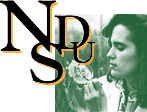 |
|
How To Use This Site
| Introduction:
The threefold purpose of this website is: 1) to provide an identification guide to the moths of North Dakota and in so doing, 2) to provide a pictorial catalogue of species, each page is then 3) to serve as a repository of distributional information on North Dakota moths. |
Moths of North Dakota is intended to be useful at both professional and non-professional levels of interest; the photo gallery provides quick access to myriads of pictures of moths and their larvae, the family guide provides brief information on the major groups of moths commonly found in the state, while the identification keys will help differentiate between closely similar species. A pictorial glossary has been provided since there is no possible way to spare the terminology when dealing with such an array of species. It should be noted however, that this is an evolving long term project (there are as of this writing about 1,400 species of moths known from the Dakotas) and new pages will be constantly added and older pages updated as more information becomes known.
| Photo gallery:
Pictures of adult moths and larvae can be found here. One can either glance through all the illustrations of adult moths and larvae, or use the species list to look-up a particular moth. At this site, larvae can only be 'picture matched’ as a complete (equally as large second web site) would be required for larval identification. Larvae are best identified by rearing out the adult moth as a great deal of life history information remains to be discovered..
|
|
|
|
| Moth Families:
These are one page synopses for each moth family (plus literature) known to occur in North Dakota, each page contains one or more representative pictures, identification characters, a statement on diversity, general life history information and important literature. This facility will also grow as the website itself develops.
|
| Identification keys:
Here can be found keys to identify difficult groups or, simply a means to narrow the number of choices upon the users return to the photo gallery. The main page includes a short description of keys and their use and the overall identification key to superfamilies of Lepidoptera (Order of moths and butterflies) is highly recommended to narrow the initial search. In this key, the North Dakotan families and major subfamilies are characterized under each superfamily. Also on the main page are links to keys for groups of similar species, genera, or subfamilies. This portion will expand as the site develops.
|
| Glossary:
Six pages illustrate the vocabulary used under the identification headings. They precede from most general anatomy, wing pattern elements (simple and detailed), to detailed anatomy, ancestral wing venation, and derived wing venation. A textual glossary is also present. As the site develops, at least two additional illustrative pages will be added. |







